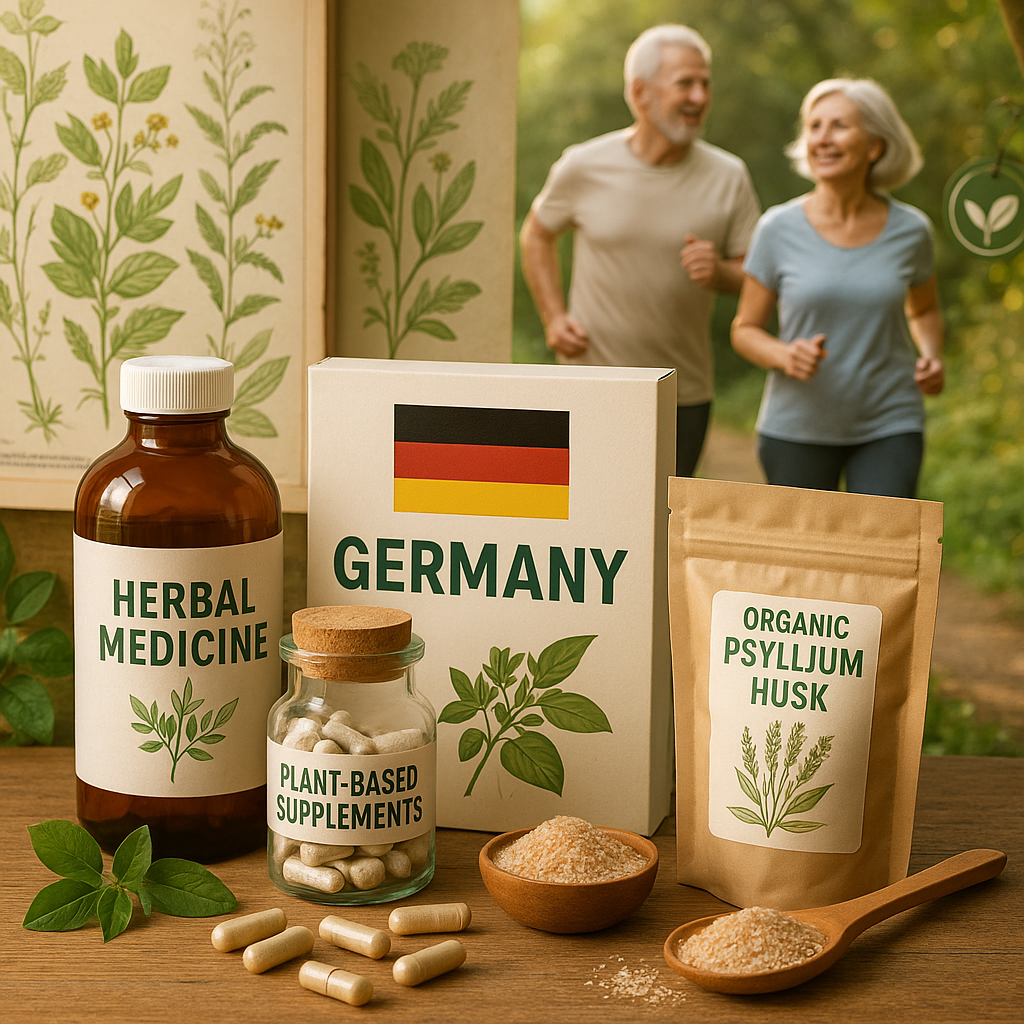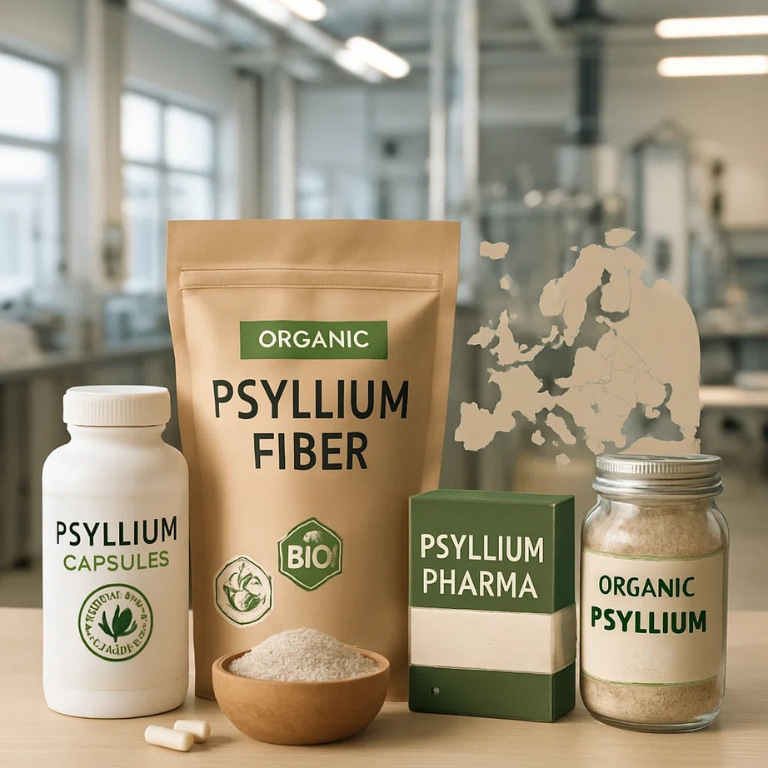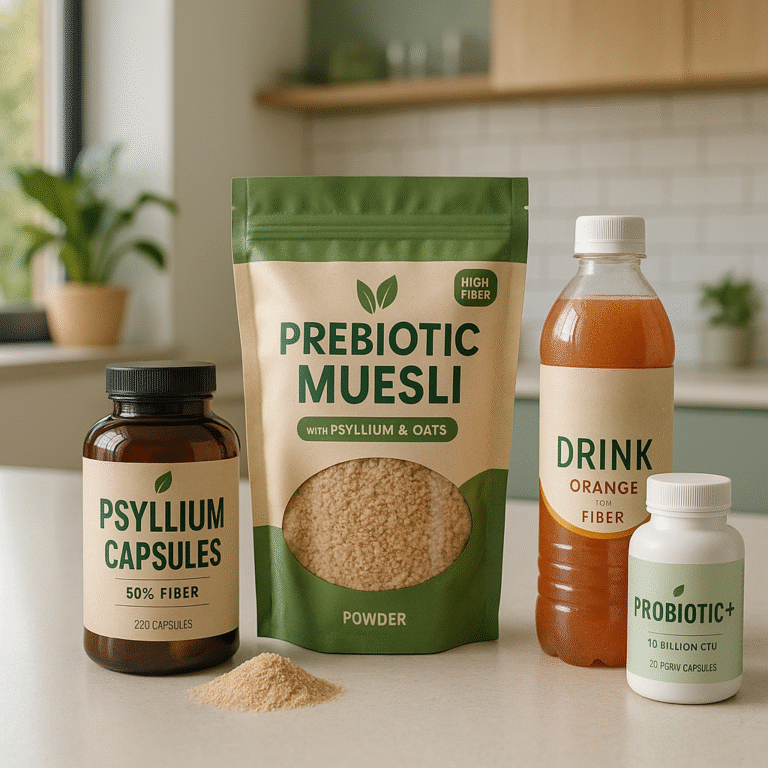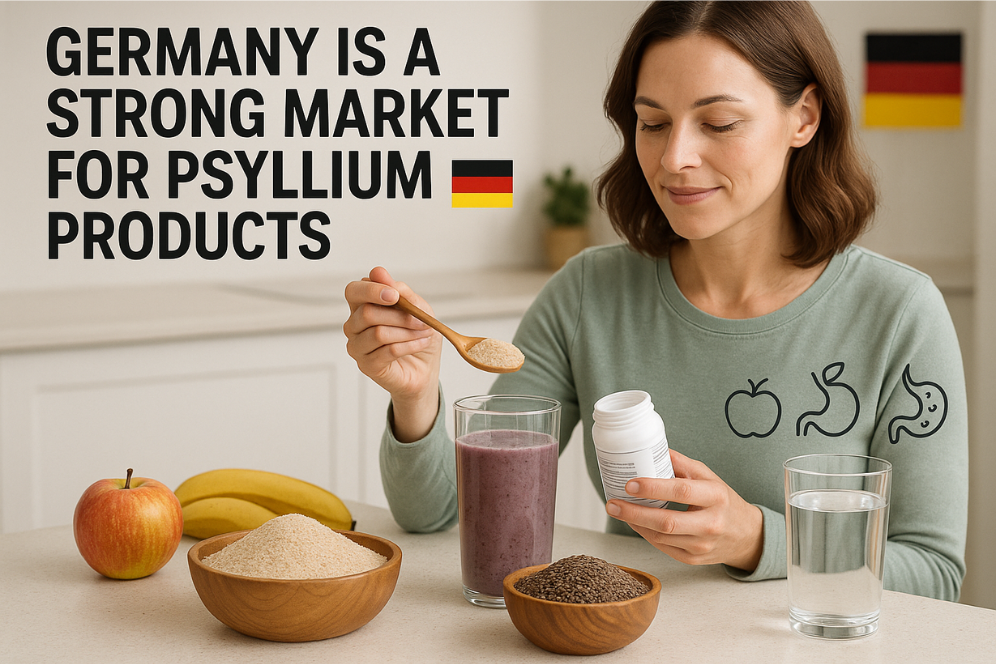Table of Contents
What is Psyllium, and Why Is It Gaining Popularity?
Psyllium, derived from the seeds of the Plantago ovata plant, has become a highly sought-after natural product due to its numerous health benefits. Known for its high fiber content, psyllium is used in various forms, including husk, seeds, and powdered forms, all of which offer substantial digestive and health benefits. It’s particularly beneficial for those seeking relief from constipation, managing cholesterol levels, or looking to enhance their overall gut health. The increasing trend toward natural remedies and a fiber-rich diet has led to a growing interest in psyllium, especially in countries with advanced healthcare systems and increasing awareness of wellness, such as Germany.
Overview of the German Market for Natural Health Products
Germany has long been a leading country in Europe, particularly in the health and wellness sector. With a population of over 80 million people, the country has a strong tradition of using natural remedies and supplements to complement modern medical practices. This is evident in the booming market for natural health products, including herbs, supplements, and other dietary aids. The demand for dietary fiber supplements, including psyllium husk, psyllium seeds, and psyllium husk powder, has risen sharply in recent years due to increasing health consciousness and the shift towards preventative health measures.
Why is Germany a Leader in the Health and Wellness Industry?
Growing Demand for Natural Supplements in Germany
Germany has become a global leader in natural supplements, with an expanding market for plant-based, organic, and sustainable products. This can be attributed to the country’s deep-rooted traditions of herbal medicine, coupled with a growing understanding of the need for preventive healthcare. More consumers are looking for natural alternatives to pharmaceutical drugs, and the demand for products like psyllium has soared as people seek solutions for digestive health, weight management, and overall well-being.

Health Consciousness and the Aging Population
The German population is aging, and with it, the awareness of the need for health maintenance has grown significantly. Older adults are more likely to suffer from digestive issues, including constipation, and are actively seeking natural solutions like psyllium husk to alleviate these concerns. As people age, they also become more conscious of the risks associated with heart disease, diabetes, and obesity, and psyllium has proven to be a versatile option to address these issues. The combination of a health-conscious public and an aging demographic has provided a solid foundation for the growth of psyllium products in Germany.
What Makes Psyllium Products so Popular in Germany?
Health Benefits of Psyllium Husk, Seeds, and Powder
Psyllium products, including husk, seeds, and powder, offer numerous health benefits that appeal to German consumers. The most significant benefit of psyllium is its ability to promote digestive health. Psyllium acts as a bulk-forming laxative, which helps relieve constipation and regulate bowel movements. Additionally, its high fiber content aids in lowering cholesterol levels, supporting heart health, and managing blood sugar levels, making it an appealing product for individuals with diabetes. The increasing awareness of gut health and the role of fiber in overall wellness has fueled the popularity of psyllium in Germany.
The Role of Psyllium in Digestion and Gut Health
Increased Interest in Fiber-Rich Diets
There has been a significant shift towards fiber-rich diets in Germany as people have become more aware of the numerous health benefits of fiber. As one of the most reliable sources of dietary fiber, psyllium is often incorporated into daily routines through supplements, smoothies, and other health products. Psyllium not only helps with digestion but also contributes to maintaining a healthy weight and reducing the risk of chronic diseases like heart disease and diabetes, further enhancing its appeal in the German market.
How Does the German Market Support the Growth of Psyllium Products?
Regulatory Support for Natural Health Products

Growing Organic and Eco-Friendly Product Trends
Innovation in Product Offerings
Why Are Psyllium Husk, Seeds, and Powder Important to German Consumers?
Psyllium for Digestive Health
Use of Psyllium in Weight Management and Cholesterol Control
The Role of Psyllium in Managing Diabetes and Heart Health
How Does the German Healthcare System Influence the Demand for Psyllium Products?
Strong Healthcare Infrastructure and Focus on Preventative Care
Germany’s healthcare system is one of the most advanced in the world, with a strong emphasis on preventative care. The country has a well-established public health system that focuses on promoting health and preventing diseases rather than just treating them. This preventative approach aligns perfectly with the growing demand for natural products like psyllium, which can help reduce the risk of chronic diseases such as heart disease, diabetes, and obesity. Psyllium products, with their well-documented health benefits, are being recommended by healthcare professionals as part of a holistic approach to health and wellness.
Preventative care in Germany also includes extensive public health campaigns that encourage people to take charge of their own health. These campaigns often include advice on improving diet, increasing fiber intake, and adopting healthy lifestyle choices—recommendations that naturally lead to the increased consumption of psyllium products. As healthcare costs continue to rise, the demand for effective, low-cost, and natural preventative solutions like psyllium is only expected to grow.
Reimbursement Policies and Support for Health Supplements
Germany has a well-established reimbursement policy for certain health supplements that provide medical benefits, especially for conditions like constipation and cholesterol management. This has opened up a pathway for products like psyllium husk, seeds, and powder to be more widely recommended by healthcare providers and potentially covered by health insurance. When these products are seen as part of a treatment plan for digestive issues or other health concerns, consumers are more likely to view them as accessible and necessary, driving further demand in the market.
The robust healthcare policy also ensures that only high-quality products make it to the market, offering peace of mind to consumers who want to integrate natural supplements into their daily routines without worrying about their safety or efficacy.
What Impact Does Germany’s E-commerce Sector Have on the Psyllium Market?
Online Shopping Trends for Health Products
Germany has one of the most developed e-commerce markets in Europe, and this has had a profound impact on the growth of health products like psyllium husk. Online shopping has become increasingly popular for purchasing health supplements due to convenience, the ability to compare prices, and a wider variety of available products. For psyllium products, e-commerce platforms provide consumers with access to an extensive range of brands and product types that they might not find in traditional retail stores.
This online shopping trend has also led to greater consumer education. Many e-commerce platforms offer detailed product descriptions, reviews, and expert advice, which help German consumers make informed decisions about the psyllium products they purchase. The ability to buy these products with ease and have them delivered directly to their door has contributed significantly to the market’s growth.
Growth of Direct-to-Consumer Sales Channels
Direct-to-consumer (DTC) sales models have also played a key role in the success of psyllium products in Germany. Many psyllium brands are choosing to bypass traditional retail channels and sell directly to consumers through their websites or third-party platforms. This not only allows brands to control their messaging and customer experience but also enables them to reach a wider audience.
By selling directly to consumers, brands can offer better pricing, more personalized services, and the flexibility to cater to individual needs, which is particularly important in the health and wellness sector. The DTC model is also aligned with the growing demand for transparency in ingredient sourcing and product formulation, allowing consumers to make more informed choices.
The Role of Influencers and Social Media in Promoting Psyllium
Social media and online influencers have become pivotal in shaping consumer purchasing decisions in recent years. In Germany, many health and wellness influencers are sharing their experiences with psyllium products, highlighting their benefits and offering product recommendations to their followers. This has contributed to the rising popularity of psyllium products, especially among younger, health-conscious consumers.
In addition to influencers, online platforms such as YouTube, Instagram, and blogs have become hubs for health discussions and product reviews, allowing consumers to gather first-hand information about psyllium. As a result, brands are increasingly relying on these digital channels to promote their psyllium products and connect with consumers in a more personal and engaging manner.
What Are the Future Trends for Psyllium Products in Germany?
Advancements in Psyllium Product Formulations
As the demand for psyllium products continues to rise, German companies are innovating to create new and improved formulations that cater to diverse consumer needs. For instance, the development of psyllium-based products for specific health issues, such as weight management, digestive disorders, and heart health, is gaining momentum. Additionally, some companies are exploring new delivery forms for psyllium, such as capsules, functional foods, and ready-to-drink beverages, making it easier for consumers to incorporate psyllium into their daily routines.
There’s also growing interest in combining psyllium with other superfoods or supplements, such as probiotics or prebiotics, to enhance its digestive benefits. These product innovations are expected to drive continued growth in the German market for psyllium products.




